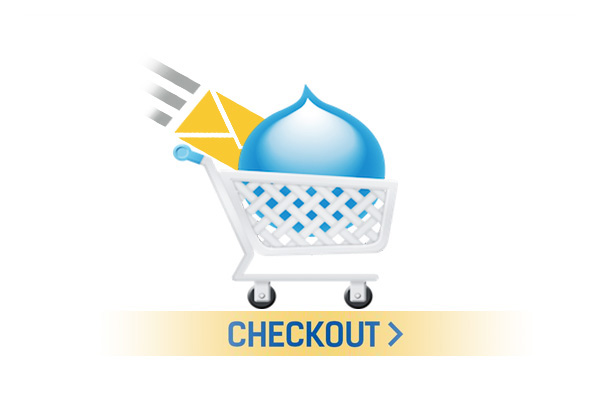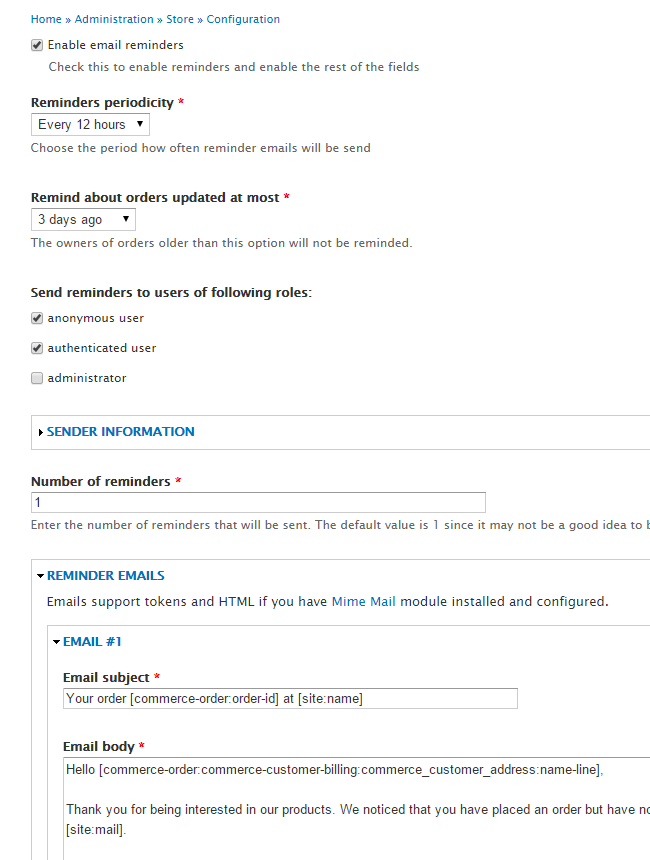Commerce Order Reminder - send automatic reminders of uncompleted orders on your Drupal website

Commerce Order Reminder is my first full project at Drupal.org that sends automatic email reminders of the orders that have not been completed. The only requirement is an email address bound to the order, which either is entered on the billing information step for anonymous users or equals to account email for authorized users. Once the module is set up, you don't need to worry about it anymore, since all the email reminders will be sent automatically with the periodicity you specify. This article provides a detailed description of the module and its settings.
The module page: https://www.drupal.org/project/commerce_order_reminder
Command to install:
drush en commerce_order_reminder -y
Commerce Order Reminder was born out of the need of our company to send email reminders, and as it seemed to be a reusable piece of functionality, I decided to implement it as a separate Drupal module. Even though I couldn’t find a ready solution at the moment of starting the development, a similar solution–Commerce Notification–was eventually found. My module has some differences, which will be listed at the end. In this post, I am going to describe the usage of the module in more details than I did in the module summary at Drupal.org.
Commerce Order Reminder features
The module’s settings page is located at admin/commerce/config/commerce-order-reminder. From the first look, there might a lot of stuff, so let’s go through each setting step by step.

- Enable email reminders–a general setting that enables or disables sending email reminders automatically. By default, it is disabled, and you should enable it after you’ve gone through the other settings.
- Reminders periodicity–in case, you decide to set more than one reminder, this setting would indicate the time period between each reminder. This setting may not be precise, as the reminders are being sent on cron run, which by default runs once per three hours. It also serves as the minimum order age–the uncompleted orders younger than this period will not be reminded of;
- Remind about orders updated at most–the maximum age of orders to send reminders about. If the order is older than this, it is considered forgotten, and the owner will be finally left alone 😄;
- Send reminders to users of following roles–this is straight simple: you may choose users of which roles will be receiving the reminders. If it does not matter, check anonymous and authenticated users (as all users of other roles are authenticated users, the second checkbox will cover them all);
- Sender information–under this collapsible fieldset, you may specify the name and the email address of the sender. By default, website name and email are used;
- Number of reminders–the amount of emails that will be sent to remind about the abandoned order. Usually it is one, but if you feel like bothering your potential customers several times, you are free to go! This field triggers an Ajax request that loads according amount of fields in the fieldset below. Note that it is possible to set the maximum age of order more than the age at which the last reminder(s) should be sent (and they won’t be sent even though you set them up). You’ll get a warning in that case anyway.
- Reminder emails–Fill email reminder subjects and bodies within this fieldset. The number of letters equals to the number of reminders that are specified in the previous setting. You can use website tokens here, including those, referring to the current order. For instance, if you want to use dynamic order ID in the email text or subject, simple place
[commerce-order:order-id]–it will be replaced with a real order ID when the email is sent. In addition, if you install Token module, you will see all the tokens available to use in a convenient token tree widget; - Send test email–if you want to see what your reminder will look like, use this fieldset and enter your email address. A test email with the information of the most recent order will be sent to you, so you can check if everything looks good and make any corrections if necessary.
Differences from Commerce Notification
As mentioned, Commerce Order Reminder is designed for lazier website administrators who prefer to set up things once and enjoy them working automatically. Commerce Notification requires manual actions each time you want to send a reminder and does not allow reminding your customers more than once. Although it has advanced features, such as reminding a customer to buy something (maybe with a discount) on their birthday, some of them go out of the scope of reminding about abandoned orders.
Even though there are numerous differences between these two modules, I am feeling a bit like I have reinvented a wheel. It’s up to you to decide which one to use, and no matter what you choose, I will you good luck with bringing your forgetful customers back. Thanks for reading!